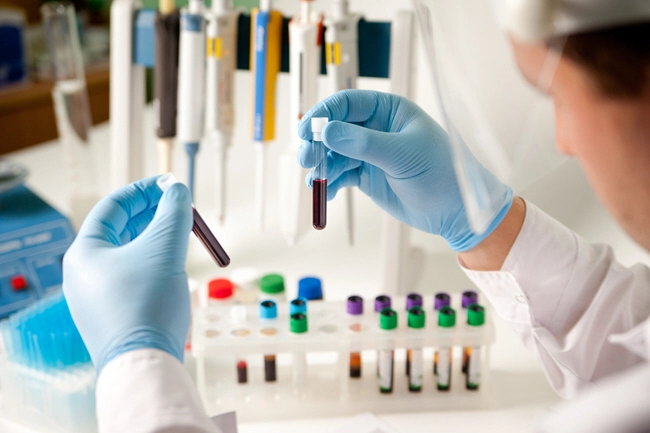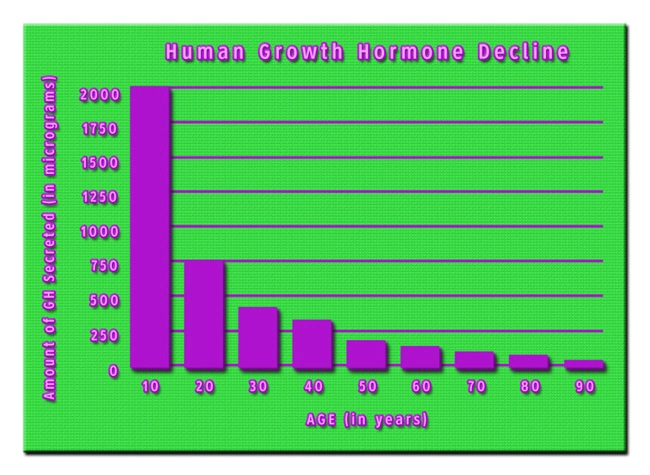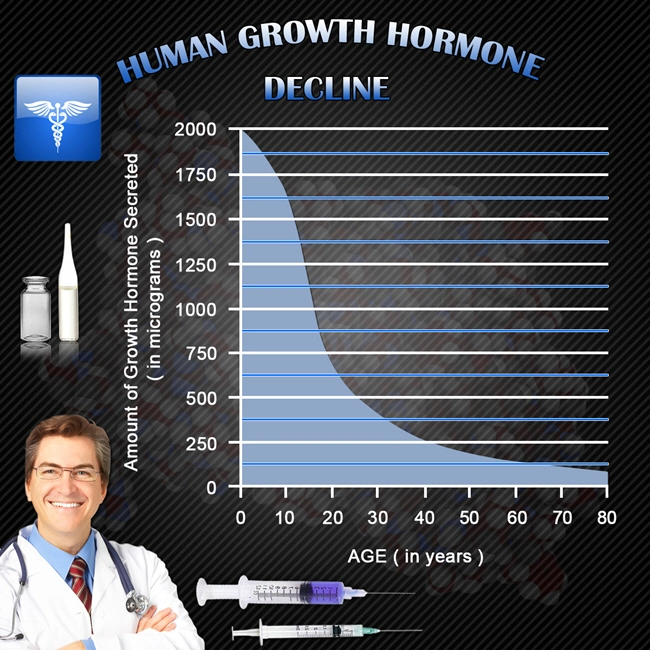
Video Link: https://vimeo.com/255868075
Video Download: Click Here To Download Video
Video Stream: Click Here To Stream Video
The Importance of Nutrition
The facts are in, and the conclusions are clear and inescapable: Human Growth Hormone Replacement Therapy (HGH-RT) and Testosterone Replacement Therapy (TRT) have ushered in a golden age of youthfulness and physical and mental fitness. For the first time in history, we can erect a powerful roadblock to premature aging…and even begin to push the clock backward.
 This is the miracle of HGH and TRT. In fact, if you do nothing else…absolutely nothing else…the results will amaze and delight you, as you witness and experience the incredible transformations that their therapies can produce. But why stop there?
This is the miracle of HGH and TRT. In fact, if you do nothing else…absolutely nothing else…the results will amaze and delight you, as you witness and experience the incredible transformations that their therapies can produce. But why stop there?
There is more you can do, so much more. And the best news is this: The Conscious Evolution lifestyle is easy to adapt.
There’s much more to tell you, but before we delve into details, keep in mind the overriding, singular philosophy of Conscious Evolution: you are in charge! You and only you will make the decisions that will propel your vitality, physical and mental health, youthfulness, and personal improvements to unimaginable heights.
That’s right. Once you begin to make these positive changes in your life, you will see and feel the difference -- the incredible, mind-boggling difference -- in the quality of your life, in all areas. But first, let’s take a brief look at the big picture.
Where we’ve been. Where we’re at now, and, most important, where we will be in the immediate future. Did you know that for most of human history, the average lifespans were minuscule when compared to today’s standards? Anthropologists tell us that our cave-dwelling ancestors were, for the most part, toothless at 25, dead at 35.
In fact, as recently as 1900, the average male lifespan in America was 47 years.
Read that number again, and let it sink in. In the overall scheme of things, 1900 was a mere nanosecond in the past. However, thanks to breakthrough’s in 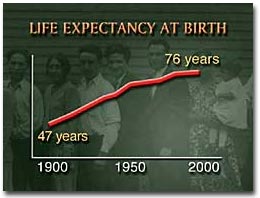 medicine, hygiene, and nutrition, the 20th century witnessed an explosion in life expectancy. Living until the late 70s and 80s was the expected norm, not the exception that had previously been the case.
medicine, hygiene, and nutrition, the 20th century witnessed an explosion in life expectancy. Living until the late 70s and 80s was the expected norm, not the exception that had previously been the case.
However, in the past few decades, we are witnessing a reversal in this longevity trend. Not only are we not living longer…we are wasting an increasing number of years in ill health. In fact, when compared to 34 other developed nations, Americans had dropped from #20 in 1990 to #27 in 2010.
This decrease in lifespan is even though per-capita health care spending in the United States is far higher than any other country, and we lead the world in medical research.
So, what’s the problem? Why is this so? There is no one direct cause of the pathetic state of health for all too many Americans.
Poor dietary choices, physical inactivity, chronic sleep deprivation, dehydration, and stress all add up to take a terrible toll on our health. However, on second thought, perhaps it all boils down to one cause after all:
The failure to live a Conscious Evolution Lifestyle.
Think about it. Every one of the problems listed is a result of bad decision-making when it comes to lifestyle choices…every last one of them. At first glance, this may seem depressing. However, with more in-depth reflection, it is encouraging, since it proves what was mentioned earlier.
The philosophy of Conscious Evolution is that you are in charge…for better or worse. With that in mind, let’s take a look at the proven, scientific principles of Conscious Living… principles that you can begin to put to use immediately.
It Starts with the Science of Nutrition
 No question about it. More and more people are concerned about their food choices. This includes not only being more worried about what they eat but also eating organic and taking supplements as insurance against any nutritional deficiencies.
No question about it. More and more people are concerned about their food choices. This includes not only being more worried about what they eat but also eating organic and taking supplements as insurance against any nutritional deficiencies.
For years, the average American diet has meant that we are digging our graves with our forks, knives, and spoons. However, many folks are finally waking up to the fact that you are what you eat!
Consider this scenario: You are buying a new pair of running shoes. One pair is inexpensive, to put it politely. Another pair is higher priced but has a reputation for protecting your feet and delivering a smoother, more enjoyable running experience.
Perhaps you are tempted by the cheaper pair. But if you sprain your ankle while running, or if the cheap material causes more wear and tear on your feet, ankles, knees, thighs, and hips...the more inexpensive pair may turn out to be far more expensive than the higher-priced tennis shoes.
It is the same with food. Junk food may be cheaper and more convenient. But in the long run, it may cost you your most precious possession: your good health.
Don’t cut corners!
Today, more folks are aware of the importance of proper eating, and many insist that they are making smarter, more informed decisions about their food choices.
But how true is that? A recent study concluded that the obesity rate in the USA has skyrocketed to over an astonishing 38%! And that’s not just overweight. That’s  obese.
obese.
Why? What has happened to make so many mid-sections balloon to such mammoth dimensions?
Four reasons. First, many folks are overwhelmed with the increasing demands of work and family and fall into the trap of eating for speed, not nutrition.
Second, many people are not sure as to what food choices are healthy. And who can blame them?
It often seems as though the “food experts” change their recommendations regularly. What was terrible a few years ago is now good, depending on who you listen to.
Third, the food industry has added several chemicals to our food that many nutritionists insist are propelling the obesity epidemic.
 Fourth, our medical professionals. New medical procedures are developing at a blistering pace, and our doctors are duty-bound to stay on top of all breakthroughs.
Fourth, our medical professionals. New medical procedures are developing at a blistering pace, and our doctors are duty-bound to stay on top of all breakthroughs.
As a result, nutritional advice is not at the top of many physicians' priorities.
When we consider how important proper nutrition is, think about this: heart disease, diabetes, and cancer numbers are surging from just a few decades ago. We can’t overlook our changing eating patterns in this surge.
But There are Things We Can Do
Correct, intelligent eating can be incredibly complex and complicated. But there are a few simple rules to cut through all of the confusion surrounding this critical topic:
Stop eating so much junk. If the food you’re considering is artificially loaded with man-made chemicals, minimize your intake of that garbage. Better still, cut it 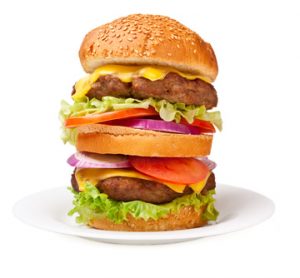 out completely.
out completely.
Up your intake of fresh vegetables and fruits. Nutritionists, dietitians, doctors, and virtually all medical professions agree that fresh produce is an absolute cornerstone of healthy eating. Enough said. Vegetables and fruits come in a wide array of colors, so don't be afraid to try new produce.
Eating sufficient amounts of protein. Protein is our muscle-builder, speeds up our recuperative powers, and ramps up our immune system. Look to make protein 30% to 40% of your daily food consumption.
Consider juicing. Commercially bought juicing machines are a way to get added fruits and vegetables into your daily nutrition. There is a broad range of fruit 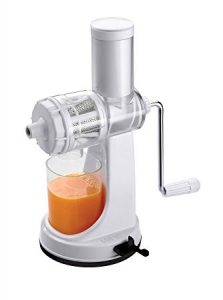 and vegetable combinations that deliver a one-two punch: great taste and powerful nutrition.
and vegetable combinations that deliver a one-two punch: great taste and powerful nutrition.
Make sure you are drinking an ample amount of water. Hydration helps your cells remove accumulated wastes and toxins and keeps your thinking sharp.
Control your food portions. To trick your brain into thinking your meal is large, use a smaller plate.
Cut back dairy and insist on only eating dairy from free-range chickens and grass-fed cows. Milk can provide you with essential minerals, so don't cut it out completely. But don't overdo your consumption.
Consider ditching the idea of eating three meals per day. More frequent, smaller feedings can help you control hunger.
Eat early in the day. Late-night eating is a proven Growth Hormone killer.
Start the day with green tea. Green tea is loaded with health benefits.
Choose organic when possible. Natural foods are a bit more costly. But studies have repeatedly shown that food that is organically grown is well worth the added cost.
Don't ignore fats. For all-too-long fats have been demonized as the leading cause of the obesity epidemic. However, recent research has demonstrated the beneficial effect of healthy fats (salmon, avocados, walnuts, almonds, olive oil). The right type of fats plays a crucial role in maintaining your youthful appearance and performing many essential internal functions.
Here's the key: unsaturated fats like the fats mentioned above are good. Saturated fats (milk, cream, butter, cheese, beef, pork), when consumed excessively, may wreak havoc on your cholesterol levels and should not be a huge part of your diet.
Transfats (margarine, salad dressings, fast foods, potato chips) are bad, period. Try to keep them to a bare minimum or entirely eliminate them.
Carbohydrates. As with fats, there are "good carbs" and "bad carbs." Complex carbs (fresh fruits and vegetables, oatmeal, brown rice, sweet potatoes, legumes, and beans) provide a slow release of glucose, which does not cause a spike in blood sugar levels. Complex carbs also deliver roughage which helps our digestive system perform its essential functions. Furthermore, complex carbs provide an efficient source of energy.
Simple carbs (white bread and rice, sodas, cakes, pies, and candy) will give you a rapid energy jolt. However, this energy jolt won’t last long since simple carbs elevate your blood sugar to spike, making you tire faster. As with bad fats, don't make simple carbs a mainstay of your diet.
Avoid the latest fashionable diet craze. Some of these radical approaches to eating can have some validity. But often, they miss the mark on many vital aspects.
25 Foods for Better Health
Yogurt. Yogurt is rich in probiotics, which help with digestion.
Yams. Yams are an excellent source of vitamin C, B vitamins, potassium, and fiber.
Turkey (skinless breast). An outstanding choice for lean protein and several vital minerals: zinc, iron, phosphorus, and potassium.
Tuna (water-packed). A low-fat source of protein and minerals.
Tomatoes. Tomatoes are rich in all four main carotenoids: beta-carotene, lutein, lycopene, and alpha-carotene—powerful prostate protection for men.
Soybeans, Rice (Brown). Jam-packed with calcium and magnesium salts, as well as protein and B vitamins.
Potatoes (baked). Baked potatoes are a low-calorie treat that delivers a load of pantothenic acid, phosphorus, and manganese.
Papaya. This Hawaiian delight contains papains, an enzyme that helps digestion.
Oranges. Known mainly for their vitamin C content, oranges are rich in fiber, as well as several vitamins and minerals.
Onions. In addition to controlling blood sugar and lowering inflammation, onions can also inhibit the growth of tumors that may turn cancerous.
Oat Bran. Fiber, fiber, fiber. When it comes to fiber, oat bran is near the top of the list.
Lamb. Here is an often-overlooked source of protein, several crucial vitamins and minerals, and CLA (Conjugated Linoleic Acid), a healthy fat.
Kiwi. Kiwi is loaded with vitamins A, B, K, and E, copper, and fiber.
Greens (spinach, kale, chard). Vitamins, minerals, phytochemicals -- greens have it all.
Garlic. Besides coming in with a broad range of all the essential vitamins and minerals, garlic contains allicin which boosts the immune system and lowers blood pressure.
Garbanzo Beans. Garbanzo beans are loaded with carbohydrates and fiber. These two ingredients combine to ramp up your energy and keep your digestive system in tip-top shape.
Fresh Pasta. Low in fat and calories, fresh pasta also contains no cholesterol. This makes pasta a healthy energy booster.
Carrots. Carrots deliver vitamin A and fiber.
Cantaloupe. Cantelope comes with vitamins, minerals, and alpha-linolenic acid, a healthy fat.
Broccoli. Loaded with vitamins and minerals, broccoli does it all: cancer prevention, detoxification, skin health -- the benefits just keep coming.
Bell Peppers. Bell peppers contain more than three times the vitamin C of oranges.
Beans. Loaded with minerals and fiber, beans excel at disease prevention.
Bananas. Known for their high potassium content, bananas contain many other vitamins and minerals and are low in calories and high in fiber.
Avoid These 25 Foods
Yogurt in Syrup
White Vinegar
White Sugar
White Rice
White flour
Tuna, in oil
Soft drinks
Soft Cheeses
Saturated Fats
Processed Meat
Processed Cheese
Processed Cereals
Pork
Pickled Eggs
Ice Cream
Gravies
Fried Foods
Chocolate
Canned Soup
Canned fruit
Bacon
Anchovies
Alcohol
This list is a useful tool to use in your nutritional plan. Don't ignore it.
Putting it all Together: a Few Ideas to Keep in Mind.
1. Put your diet plan on paper. Decide what you will eat and when you will eat it. Also, make a habit of recording your food and calorie intake. 
2. Eat breakfast. Start your day off by providing the fuel you need to power you through the day.
3. Eat slowly. Research has demonstrated it takes around 15 to 20 minutes for the stomach to signal the brain to stop eating. Eating slower means fewer calories consumed.
4. Don't eat at night. Food consumed late in the evening tends to turn to fat.
5. Learn food preparation options. There are many ways to prepare food that will ensure you enjoy your meal while filling your body with hi-octane nutrition.
6. Bring a shopping list to the grocery store. This list will stop impulse buying.
7. Don't eat mindlessly out of boredom. Let hunger be your guide.
8. Stop eating when you're full.
9. Educate yourself on food additives. Read labels and avoid the bad stuff.
10. Your body and mind give you feedback on your food selection. Listen to it!
Growth Hormone Replacement and Powerful nutrition = the winning formula!
Contact us for a FREE, no-obligation discussion about the benefits of growth hormone restoration.
References
Why is nutrition important?
The role of nutrition in maintaining health and preventing disease.
Nutrition: What is it and why is it important?
Contact Us Today For A Free Consultation
Dear Patient,
Once you have completing the above contact form, for security purposes and confirmation, please confirm your information by calling us.
Please call now: 1-800-380-5339.
Welcoming You To Our Clinic, Professor Tom Henderson.

- Obese Patients Have a Higher COVID-19 Mortality Risk Than the General Public [Last Updated On: January 24th, 2025] [Originally Added On: August 21st, 2020]
- The Health and Hormone Balancing Qualities of Broccoli [Last Updated On: August 11th, 2025] [Originally Added On: August 27th, 2020]
- What to eat to boost testosterone [Last Updated On: September 14th, 2025] [Originally Added On: December 14th, 2020]
- Breaking a Weight Loss Plateau: How to Reduce Body Fat When Nothing Seems to be Working [Last Updated On: January 20th, 2025] [Originally Added On: February 16th, 2021]
- The Top 25 Most Nourishing and Sustaining Foods to Add to Your Diet Today for Increased Longevity [Last Updated On: January 16th, 2025] [Originally Added On: February 16th, 2021]
- Fight Inflammation and Osteoporosis with Beets! [Last Updated On: January 14th, 2025] [Originally Added On: February 18th, 2021]
- Break a Weight Loss Plateau with Apple Cider Vinegar [Last Updated On: January 14th, 2025] [Originally Added On: February 20th, 2021]
- An Intriguing Look into How Growth Hormone Production and Fasting are Linked [Last Updated On: January 18th, 2025] [Originally Added On: February 21st, 2021]
- Health Reasons for a Vegan Diet [Last Updated On: October 25th, 2025] [Originally Added On: April 2nd, 2021]
- Leafy Greens are Medicine for Your Gut [Last Updated On: September 27th, 2025] [Originally Added On: April 23rd, 2021]
- All Praise to the Spud -- the Delicious, Health-Giving Potato, That Is [Last Updated On: August 12th, 2025] [Originally Added On: June 1st, 2021]
- 16 Cancer-Causing Foods to Avoid [Last Updated On: May 21st, 2025] [Originally Added On: August 12th, 2021]
- Longevity and Anti-Aging -- The Use of Flax Seed Oil [Last Updated On: May 7th, 2025] [Originally Added On: August 17th, 2021]
- Essential Amino Acids Critical to Health and Hormone Balance [Last Updated On: June 13th, 2025] [Originally Added On: October 6th, 2021]
- Growth Hormone and Calcium [Last Updated On: January 11th, 2025] [Originally Added On: October 16th, 2021]
- Growth Hormone and Coffee [Last Updated On: January 9th, 2025] [Originally Added On: October 19th, 2021]
- The Importance of Protein in Weight Loss and Testosterone Production [Last Updated On: January 19th, 2025] [Originally Added On: October 19th, 2021]
- Testosterone, Growth Hormone, and Sugar. [Last Updated On: January 9th, 2025] [Originally Added On: October 19th, 2021]
- Testosterone, Growth Hormone, and Processed Meat [Last Updated On: January 8th, 2025] [Originally Added On: October 19th, 2021]
- Growth Hormone and Intermittent Fasting [Last Updated On: February 7th, 2026] [Originally Added On: October 19th, 2021]
- Growth Hormone Stops Inflammation! [Last Updated On: January 8th, 2025] [Originally Added On: October 20th, 2021]
- Growth Hormone and Sugar Addiction [Last Updated On: February 1st, 2026] [Originally Added On: October 20th, 2021]
- Growth Hormone and Red Meat [Last Updated On: February 3rd, 2026] [Originally Added On: October 20th, 2021]
- Boost Growth Hormone with Sleep [Last Updated On: May 20th, 2025] [Originally Added On: October 20th, 2021]
- A Natural Acid Found in Apples Prevents Muscle Loss AKA Sarcopenia [Last Updated On: January 10th, 2025] [Originally Added On: October 20th, 2021]
- Growth Hormone and Organic Foods. [Last Updated On: January 30th, 2026] [Originally Added On: October 21st, 2021]
- Growth Hormone and Acidosis [Last Updated On: February 4th, 2026] [Originally Added On: October 21st, 2021]
- Growth Hormone Food Choices [Last Updated On: January 29th, 2026] [Originally Added On: October 21st, 2021]
- Growth Hormone and Cholesterol: the Surprising Link [Last Updated On: February 6th, 2026] [Originally Added On: October 22nd, 2021]
- Growth Hormone and Weight Loss [Last Updated On: January 31st, 2026] [Originally Added On: October 22nd, 2021]
- Growth Hormone Reduces Inflammation [Last Updated On: February 2nd, 2026] [Originally Added On: October 24th, 2021]
- What You Eat Impacts Both Your Sleep AND Your Growth Hormone Production [Last Updated On: January 10th, 2025] [Originally Added On: October 24th, 2021]
- Growth Hormone Lowers Blood Sugar [Last Updated On: February 5th, 2026] [Originally Added On: October 24th, 2021]
- Testosterone and Magnesium [Last Updated On: May 22nd, 2025] [Originally Added On: April 28th, 2022]
- The Beneficial Functions of Brown Fat vs. White Fat [Last Updated On: May 26th, 2025] [Originally Added On: May 3rd, 2022]
- MOTS-c Peptide for Weight Loss and Muscle Building [Last Updated On: June 11th, 2025] [Originally Added On: November 7th, 2022]
- Looking to lose weight? Add this ingredient to meals [Last Updated On: September 24th, 2025] [Originally Added On: December 7th, 2022]
- The many health benefits of black tea [Last Updated On: September 23rd, 2025] [Originally Added On: December 13th, 2022]
- Raw Food Benefits [Last Updated On: September 20th, 2025] [Originally Added On: January 18th, 2023]
- Brain Foods that Work Together with HGH to Improve Mental Sharpness [Last Updated On: February 14th, 2025] [Originally Added On: March 9th, 2024]
